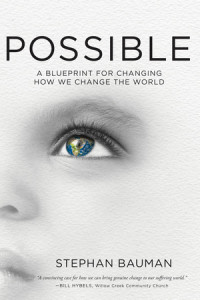Possible: A Blueprint for Changing How We Change the World
 I have to admit, I'm a little biased about this title. I heard Stephan Bauman speak a few years ago at the Justice Conference in Portland, Oregon. He was being interviewed by none other than Lynne Hybels, who is as famous in her own right as her famous husband, Bill Hybels, is.
I have to admit, I'm a little biased about this title. I heard Stephan Bauman speak a few years ago at the Justice Conference in Portland, Oregon. He was being interviewed by none other than Lynne Hybels, who is as famous in her own right as her famous husband, Bill Hybels, is.
I was struck by his gentleness, modesty, and empathy, especially given that he's the CEO of World Relief, the humanitarian arm of the National Association of Evangelicals.
When I got the opportunity to review his new book Possible: A Blueprint for Changing How We Change the World, I jumped at the chance.
Overview:
Stephan Bauman takes the reader on a journey from the personal to the global and back again. He tackles the problem of suffering the harm Christians have cause around the world, juxtaposing them with an astute and subtle treatment of personal calling.
He emphasizes the importance of allowing people in the global South (read: impoverished countries) to solve their own problems, and to seek their help as well as to offer it.
Bauman uses plenty of anecdotes, both from his personal life and from those of the people he has served alongside. The result is a compilation of ideas that seem particularly relevant.
Why you might like Possible:
Bauman blends the spiritual and ideal worlds with the practical, a rare and refreshing feat.
He is unabashed in his discussion of the need for God when doing good work in the world, but he also offers space for people's particular gifts and interests.
Bauman is keenly aware of how easy it is for Christians — or anyone else — to do more harm than good with their "help."
To think properly about poverty, we need to consider the poor as wealthy too. Materially poor people around the world demonstrate vibrancy, human strength, perseverance, ingenuity, joy, and unprecedented faith. I've noticed that their dire circumstances and their "wealth" often correlate. For example, their virtue, character, and faith are shaped through suffering and trial. We have to learn from these brothers and sisters.
He includes two appendices: one that allows people and groups to evaluate their beliefs and values in light of their actions; and another that helps groups work from an asset-based development framework for making change in their communities and beyond.
While the book is full of stories, Bauman also quotes extensively from a wide variety of sources, Dallas Willard, Mother Teresa, and Jürgen Moltmänn among them.
The book's greatest strength, I believe, is that Bauman helps people start where they are. From the beginning of the book, he connects with people who want to help but don't know what to do. And then he tells about his own failures in a way that never seems self-indulgent or like humble bragging.
Why you might not like Possible:
This is a book for Christians. It makes no attempt to reach out to any other audience, but any reader who doesn't want to read a Christian book should pass this by.
Bauman often reverts to clichés and too-familiar imagery. The transformation of the butterfly gets a suggestion and continual references. It's not tired, exactly, but it's not new, either.
Most of the information in this book isn't new. The Christian Community Development Association, for example, has been doing asset-based community development for a couple of decades. And there is plenty of Christian literature available on finding your calling. What is different is the compilation and Bauman's voice, which is encouraging without being too perky.
My conclusions:
I was predisposed to like Possible, but I also had worries it wouldn't offer anything new or would only be relevant to evangelicals. (I'm a mainline Protestant myself.) My worries were unfounded.
Stephan Bauman makes me believe that I can have a role in changing the world, one where I neither do more harm than good, nor am I the hero of the story. Instead, I can point to heroes already present in communities of need and offer respect and solidarity. He reminds me that throwing money at problems isn't the way to solve them. Healing broken relationships is.
There's nothing easy about Stephan Bauman's hope for a broken world, but that's what makes this book ring true. I expect it to change the way I think about my role in the world, and I'm sharing it with my church in hopes it will spark of revolution of sorts.
Full disclosure: I received a review copy of Possible from Blogging for Books. I wasn't required to write a positive review, and I wouldn't take a book if I was.